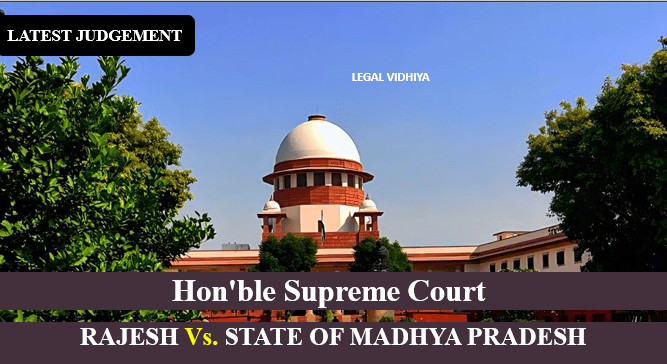
| CITATION | (SC)-2023-9-58 |
| JUDGMENT OF THE CASE | September 21,2023 |
| COURT | SUPREME COURT OF INDIA |
| APPELLENT | RAJESH |
| RESPONDENTS | STATE OF MADHYA PRADESH |
| BENCH | J. B.R. Gavai, J. J.B. Pardiwala, J. Sanjay Kumar |
INTRODUCTION
Confessions refer to statements made by a defendant admitting or implicating themselves in a crime. They are often viewed as the most dependable and conclusive evidence against the accused, presumed to be voluntary and truthful. However, confessions can be influenced by various factors like coercion, torture, inducement, threat, or a lack of understanding of the law. Hence, the legal system has established specific safeguards and criteria for admitting confessions in a court of law.
A crucial provision concerning confessions is Section 27 of the Indian Evidence Act, 1872. This section serves as an exception to the general rule that confessions made to the police are not admissible. Section 27 stipulates that if any fact is revealed as a result of information obtained from an accused person in custody, then the part of the information distinctly related to the fact thereby discovered can be presented as evidence. In essence, if a confession leads to the recovery of pertinent items linked to the crime, like a deceased body, a weapon, or valuables, that portion of the confession can be used as evidence against the accused.However, Section 27 imposes two vital conditions for its applicability: the individual must be ‘accused of any offence,’ and they must be in ‘police custody’ at the time of making the confession. These conditions are in place to ensure that the confession is pertinent and trustworthy, and not obtained through illegal or improper means.
FACTS OF THE CASE
The case involved the kidnapping and murder of a 15-year-old boy by three individuals. The boy was abducted, and his body was recovered the next day. Rajesh Yadav confessed to his involvement and provided information leading to the recovery of evidence. He was later arrested and charged.
ISSUES BEFORE THE COURT
The primary matter before the Supreme Court revolved around the admissibility of a statement provided to the police prior to the formal arrest and accusation of any offense, as per the provisions of Section 27 of the Evidence Act.
The appellant, Rajesh Yadav, contended that his confession couldn’t be considered admissible under Section 27. He argued that he hadn’t been formally charged with any offense nor was he in police custody when he made the statement. According to him, he was simply taken to the police station for questioning without being apprised of his rights or his status as a suspect. Furthermore, he asserted that his confession had been extracted from him under duress and coercion by the police.
The primary issue was the admissibility of a statement made to the police before formal arrest and accusation, as per Section 27 of the Evidence Act.
ARGUMENTS OF APPELLENT
Rajesh Yadav contended that his confession wasn’t admissible under Section 27 as he wasn’t ‘accused of any offence’ and wasn’t in ‘police custody’ at the time. He claimed his confession was involuntary and coerced.
ARGUMENTS OF RESPONDENTS
The State of MP argued that Rajesh Yadav’s confession was admissible under Section 27 as he was ‘accused of any offence’ and was in ‘police custody’ at the time. They asserted his confession was voluntary and led to crucial discoveries.
JUDGMENTS AND ANALYSIS
The Court referenced various cases to emphasize that being ‘accused of any offence’ and being in ‘police custody’ are essential for Section 27 to apply. They underscored the need for confessions to be genuine and directly related to the discovered fact.
Applying these principles, the Court found Rajesh Yadav’s confession inadmissible. He wasn’t officially accused or in police custody at the time of his statement. Any confession prior to his formal arrest was in violation of Section 26, which prohibits confessions to the police except in the presence of a magistrate.
The Court also determined that even if discoveries were made based on Rajesh Yadav’s information, they couldn’t be used against him since he wasn’t accused or in custody.
CONSTITUTIONAL VALIDITY
The Court examined the validity of Rajesh Yadav’s confession under Article 20(3) of the Constitution, which protects an accused from self-incrimination. They concluded that his confession was coerced and self-incriminating, violating this fundamental right.
OTHER EVIDENCE
The Court found other evidence presented by the prosecution insufficient and unreliable. There were inconsistencies and contradictions in the case.
CONCLUSION
The judgment reinforces the importance of protecting an accused person’s rights during interrogation. It upholds the constitutional right against self-incrimination. Ultimately, Rajesh Yadav was acquitted, while the sentences of the co-accused were modified.
REFERENCE
https://bhattandjoshiassociates.com




0 Comments